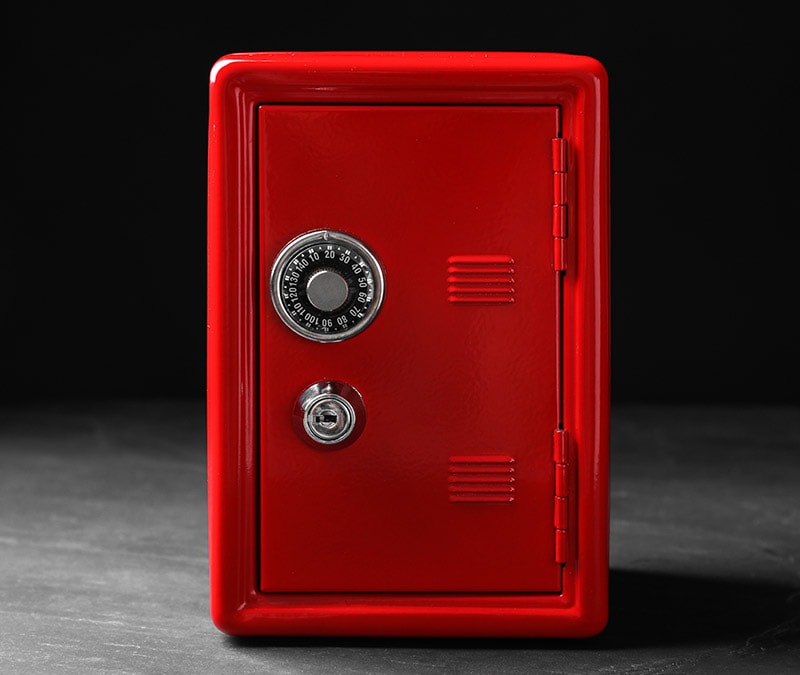Credit freezes vs. credit locks: What’s the difference and when should you use each one?
Credit freezes and credit locks help prevent scammers from opening accounts and taking out loans in your name. But there are important differences, too.

Worried that scammers could open credit card accounts or loans in your name? You should be. According to the Federal Trade Commission’s 2019 Consumer Sentinel Network Data Book, 246,000 people reported that scammers opened credit card accounts in their name that year. That's a big jump of 88 percent from 2018.
And when scammers open these accounts? They can run up purchases in your name, leaving you with credit card debt that shows up on your credit reports. Others might open loans in your name and not pay them back, something that will also show up on your credit reports and will send your three-digit credit score plummeting.
You can help protect yourself against this form of identity theft, though, by signing up for either a credit freeze or credit lock of your credit reports. Freezes and locks can help prevent scammers from opening accounts and taking out loans in your name. But they both come with important differences, too.
A credit freeze is free but is more difficult to undo. Some credit locks may require a fee, but it’s typically easier to unlock your credit than it is to unfreeze it.
Which is the right choice for you? Either will work to provide an extra layer of protection from scammers hoping to steal your identity. The choice comes down to money versus convenience.
Comparing credit freezes and credit locks
Credit freezes and credit locks have a lot of similarities. But there are a few important details.
| Credit Freeze | Credit Lock | |
| Cost | Credit freezes are provided free by the three national credit bureaus of Experian, Equifax, and TransUnion |
TransUnion: Free with TransUnion’s TrueIdentity credit monitoring service. $19.95 a month with the TrueIdentity Premium service. You can’t sign up for a credit lock without enrolling in one of the programs. Equifax: Free Experian: Free for the first 30 days, then $19.99 a month to keep the credit lock in place, after the free trial ends. |
| What it does | Prevents lenders and other financial institutions from accessing your credit reports unless you unfreeze them. |
Also prevents most lenders from accessing your credit reports until you unlock them. |
| The big differences | A credit freeze is always free. It may take more steps and time to unfreeze your reports. |
You must pay to lock your reports with some bureaus. Locking and unlocking your reports, though, is a simpler process. |
Credit freezes
It’s smart to freeze your credit. When you do, lenders can’t access your credit reports unless you give the three credit bureaus your permission to unfreeze the reports.
It makes sense, then, to keep your credit reports frozen until you actually need to apply for a mortgage, credit card, auto loan, or other loan. If you don’t unfreeze your credit, lenders won’t be able to review your credit history, and they won’t approve you for a loan. This can also help protect you from identity theft: Even if scammers attempt to take out a loan or open a credit card account in your name, their efforts will be thwarted when lenders can’t access your credit reports.
When to use a credit freeze
You should freeze your credit if you believe you’ve been the victim of identity theft or if your personal or financial information has been exposed in a data breach. Freezing your credit can help keep predators from opening new accounts in your name.
But this isn’t the only time you should consider a credit freeze. If you want to help protect yourself from identity theft, you should keep your credit frozen at all times unless you are actively applying for a new credit card or loan. When you are applying for credit or debt, you can unfreeze your credit temporarily.
Make sure, though, that you freeze your credit at all three credit bureaus.
How to start a credit freeze
You must freeze your credit at all three credit bureaus separately. The bureaus will provide you with a PIN that you can use to freeze and unfreeze your credit. Don’t lose that number. Note, though, that Equifax no longer requires you to enter a PIN when freezing or unfreezing your credit.
Experian: You can start your Experian freeze either online or by calling the bureau at 888-397-3742.
TransUnion: Start a TransUnion freeze online or by calling 888-909-8872.
Equifax: You can freeze your credit with Equifax online or by calling 888-298-0045.
How much does a credit freeze cost? There is never a charge to freeze your credit. This is a free service.
How long does a credit freeze last? A credit freeze remains active until you ask the credit bureaus to remove it. According to the FTC, if you request that your credit be unfrozen online or by phone, the bureaus must lift your freeze within an hour. Many consumers lift freezes temporarily when they are applying for new credit or loans.
How long does it take for a freeze to go into effect? Different states have different regulations regarding security freezes. In California, the credit bureaus are required to freeze your credit no later than three days after receiving your request. In New Hampshire, the bureaus must freeze your credit within five business days of receiving your request. In New Jersey, that time limit is again three days.
Will a credit freeze affect your credit score? A credit freeze will have no impact on your credit score. It also won’t stop you from ordering your free credit reports from AnnualCreditReport.com.
Credit locks
A credit lock performs the same basic function as a freeze: It prevents lenders from accessing your credit reports. This will protect you in case someone tries to open a credit card account or take out a loan in your name. Again, if lenders can’t access your credit reports, they can’t complete a loan or credit application initiated by a scammer.
The difference between a credit lock or freeze? Locks are offered as services by the three national credit bureaus of Experian, Equifax and TransUnion. This means that you might have to pay if you want your credit locked at all three bureaus.
This is a key point: Locking your credit at only one or two bureaus won’t provide you complete protection against identity thieves. You’ll need to lock your credit at all three bureaus to gain this.
Credit locks, though, are easier to manage. Once you sign up with the credit bureaus, you can access your lock through a mobile app. You can then quickly lock or unlock your credit through this app.
When to use a credit lock
As with credit freezes, it makes sense to keep your credit locked whenever you aren’t actively applying for a new loan or line of credit. In fact, this process is even easier with a credit lock: the bureaus make it easy to lock and unlock your credit quickly.
How to start a credit lock
You’ll need to contact the three credit bureaus directly to initiate a credit lock.
TransUnion: You can sign up with TransUnion’s TrueIdentity service to gain access to credit monitoring services and credit locks.
Experian: Sign up for Experian’s credit lock service here.
Equifax: You can register for Equifax’s credit lock services here.
How much does a credit lock cost? The cost of a credit lock will vary depending on the credit bureau. Experian provides this service free for 30 days and then charges $19.99 a month after the tree trial ends. Equifax provides this service at no cost. You can get your credit locked for free at TransUnion, too, but you’ll first have to sign up for the free version of the bureau’s TrueIdentity credit monitoring service. If you sign up for TrueIdentity Premium, which gives you free access to your credit report and credit score, credit locks are included in the $19.95 monthly price. Please keep in mind that the pricing listed herein is valid as of the date of publication of this article, but is subject to change over time.
How long does a credit lock last? As with a credit freeze, your credit lock will remain in place until you ask the credit bureaus to remove it, either temporarily or permanently. For the best protection, keep your credit lock in place until you are ready to apply for a credit card or loan. You can then contact the credit bureaus to temporarily unlock your credit. The difference between a lock and freeze, is that you can manage your credit lock through apps provided by the credit bureaus. You can then lock and unlock your credit reports by using identification techniques as passwords, user names, touch ID technology, or face ID tech.
Will a credit lock affect your credit score? Locking your credit will not help or hurt your credit score. You can also access your free credit reports from AnnualCreditReport.com even if you’ve locked your credit.
The bottom line
Freezing or locking your credit both have the same result: You’ll create an extra layer of protection between you and identity thieves. Freezes and locks, though, won’t eliminate all cybercrimes. They won’t protect you if a cybercriminal gains access to your credit card accounts or bank accounts. These thieves can still drain these accounts and run up charges even if your credit reports are frozen or locked.
The lesson here? Freeze or lock your credit. But don’t be lulled into a false sense of security. You’ll still need to check your credit card statements and bank accounts to look for suspicious charges or withdrawals.

Help protect against identity thieves with credit lock
Criminals can steal your identity to open credit cards, bank accounts or utilities in your name.
With a single click, Identity Lock lets you lock your TransUnion credit file to help protect against identity thieves from opening accounts in your name.
Disclaimers and references:
No one can prevent all identity theft.
† LifeLock does not monitor all transactions at all businesses.
1 LifeLock Education: “Chipotle data breach: what you need to know;” “Alteryx data leak exposes information for 123 million households: what you need to know;” “Uber data breach affects 57 million rider and driver accounts.”
2 Consumer Reports, “Why a credit freeze is better than a credit lock,” September 28, 2017.
3 www.freeze.equifax.com
Editorial note: Our articles provide educational information for you. Our offerings may not cover or protect against every type of crime, fraud, or threat we write about. Our goal is to increase awareness about Cyber Safety. Please review complete Terms during enrollment or setup. Remember that no one can prevent all identity theft or cybercrime, and that LifeLock does not monitor all transactions at all businesses. The Norton and LifeLock brands are part of Gen Digital Inc.





Want more?
Follow us for all the latest news, tips, and updates.